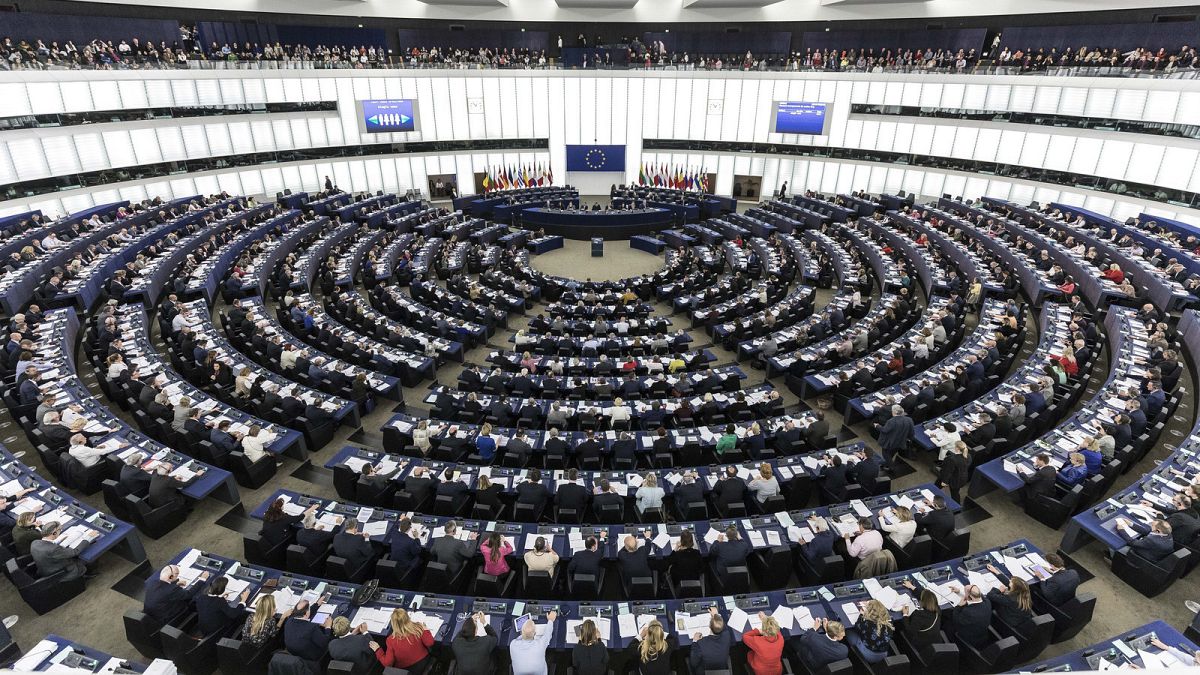Non-affiliated parties could tip political balance in next EU Parliament – exclusive Euronews poll
Exclusive Ipsos polling for Euronews shows non-affiliated parties could have a defining stake in the arithmetic – and votes – of the future European Parliament. Parties that are currently not affiliated to any of the European Union’s seven political groups are projected to clinch 68 of the European Parliament’s 720 seats in June’s election, according […]


Exclusive Ipsos polling for Euronews shows non-affiliated parties could have a defining stake in the arithmetic – and votes – of the future European Parliament.
Parties that are currently not affiliated to any of the European Union’s seven political groups are projected to clinch 68 of the European Parliament’s 720 seats in June’s election, according to a new Euronews poll unveiled yesterday (19 March).
These parties, which come from all sides of the political spectrum, could choose to sit in the parliament’s non-inscrit group (French for non-attached) – which harbours independent members as well as members of non-affiliated parties – or join ranks with one of the other seven established factions.
This means back-room negotiations on group membership could be pivotal in tipping the right-left balance of the newly-elected European Parliament.
Their sizeable projected seat number, up 19 from the current 49 they hold, also means non-attached members could have a defining stake in key votes on a broad range of EU legislation, from climate to migration to technology.
The findings come from Ipsos’ polling, exclusively for Euronews, of 26,000 people in 18 countries representing 96% of the EU population – the first of its kind in the run-up to June’s vote.
Right-wing tilt?
While the current parliament’s non-inscrit group is composed of mainly right-wing members, Euronews’ polling suggests future non-affiliated members would be ideologically split almost equally between the left (33 members) and the right (28 members).
A further seven seats could go to non-affiliated centrist or non-classifiable parties.
Should the 28 right-wing non-affiliated members choose to join any of the three right-wing factions – such as the centre-right European People’s Party (EPP), the hard-right European Conservatives and Reformists (ECR) or Identity and Democracy (ID) – it could give a potential right-wing coalition a slim majority of 362 of 720 MEPs.
This would mean that for the first time in its history, a right-wing coalition including the extreme right would have the potential to take the reins in the parliament.
It’s the result of rising support for far right parties in all corners of the continent, with radical right-wing parties expected to win the election in six of the EU’s 27 member states, including France and Italy.
Negotiations on group membership are ongoing, with several parties recently switching allegiances. France’s far-right Reconquête! party left the far-right Identity and Democracy (ID) group in February to join the Eurosceptic ECR.
Question marks also hang over the affiliation of Hungary’s Fidesz – currently non-affiliated but rumoured to be in talks to enter ECR – and Italy’s Fratelli d’Italia – Italian premier Giorgia Meloni’s party and the ECR’s biggest emerging force – which could move over to the centre-right EPP.
However, should the 33 left-wing non-affiliated members choose to join ranks with a group such as the Left, the Greens or the Socialists, it could also slightly bolster numbers for groups on the left of the spectrum, who are expected to lose ground in the vote.
These left-wing parties include Italy’s Five Star Movement, expected to clinch 16 seats, and Germany’s Bündnis Sahra Wagenknecht, an emerging force in German politics, expected to win 7 seats.
Who are the non-affiliated parties?
Hungary’s Fidesz, led by Prime Minister Viktor Orbán, is the biggest heavyweight of all non-affiliated parties, expected to scoop up 12 of Hungary’s 21 seats in June’s vote.
Fidesz quit the centre-right EPP group in 2021, just as the group was preparing to kick its Fidesz members out after years of tensions over backsliding on democracy and the rule of law.
Orbán has since consolidated his party’s dominance in Hungarian politics, and built a notorious reputation in Brussels for his willingness to use his veto power to derail EU decisions on foreign policy, including recent attempts to block the EU’s €50-billion support package to Ukraine.
His party’s policies are compatible with those of the Eurosceptic ECR, and rumours are rife Fidesz lawmakers could sit with the faction in the European Parliament after June.
But by accepting Fidesz, ECR would considerably dampen its prospects of forging new partnerships with the more moderate EPP group, the biggest of the parliament’s factions. Welcoming Fidesz could therefore prevent it from getting a long-yearned foothold in EU policymaking in Brussels.
While the EPP has openly expressed willingness to cooperate with the ECR, it has drawn a red line on parties that undermine the rule of law or sympathise with Vladimir Putin. Orbán’s dire record on the rule of law and his calls for Ukraine to negotiate peace with Putin mean that a potential ECR-EPP collaboration would collapse should his Fidesz lawmakers join the ECR.
Another emerging party not currently affiliated to any of the European political groups is Germany’s Bündnis Sahra Wagenknecht, established by the former leader of the German Die Linke (The Left) party.
While her party is classified as a left populist faction, Wagenknecht is espousing the far rights’ hard line on migration in a bid to rally voters frustrated with mainstream politics.
Her party is currently projected to finish fifth in Germany with 7% of the vote, according to the Euronews poll by Ipsos.
Italy’s Movimento 5 Stelle (Five Star Movement), the party of former Italian prime minister Giuseppe Conte, is also on track to win 16 seats.
If the party is successful in its bid to joining the left-leaning Green party, as it has attempted to do in the past, its predicted 16 MEPs could significantly change electoral arithmetic.














